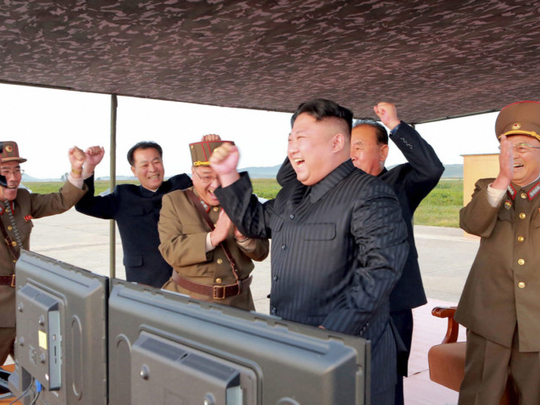
Kim Jong-un, the North Korean leader cut his baby teeth on the milk of fear and hatred towards the United States as did his father Kim Jong-il. Those emotions were generated from what has been referred to as the “Forgotten War” waged during the early 1950s by the US against North Korea with UN backing that robbed the lives of more than five million Koreans as well as 40,000 US soldiers. Its aim was to eradicate the Communist regime supported by Russia and China.
“If we let Korea down, the Soviets will keep right on going and swallow up one place after another,” said President Harry Truman.
Memories of the devastation have been indelibly etched on Kim Jong-un’s DNA, his fears amplified by the US invasion of Iraq and its role in ousting the Muammar Gaddafi regime from Libya; interventions which occurred after both countries had relinquished their WMD [weapons of mass destruction] programmes.
Yes, we can easily dismiss the stubborn and belligerent stance of Kim Jong-un as that of a madman but there is method in his madness. He is operating in survival mode.
As the Russian President Vladimir Putin and others have pointed out, he would rather his people eat grass than succumb to sanctions, no matter how crippling. Indeed, his people have resorted to consume grass and roots during the 1994-1998 famine when starvation was common in rural regions. Hundreds of thousands (by some accounts millions) died from hunger.
Kim Jong-un views his nuclear bombs and intercontinental ballistic missiles (ICBMs) as his nation’s insurance policy against attack or invasion.
What he seeks is to be recognised by the US and other western powers as a nuclear state, a fully-fledged member of the nuclear club in line with the US, Russia, China, the UK, France, India, Pakistan and Israel. Nevertheless, as Russia has warned, if he is squeezed tight into a corner he might be driven to lash out with a preemptive nuclear strike.
I do not in any way seek to defend this horrible regime whose people have been forced into gulags, beaten and tortured; a place where human rights have no place in society and ‘freedom’ is just a word in the dictionary. However, given that the crisis between the regime and the Trump administration is heading towards boiling point, I do think it’s important to attempt to understand Kim’s mindset.
His recent testing of a powerful hydrogen bomb and his launching of missiles over Japan were messages in answer to the verbal “fire and fury”/ “locked and loaded” statements emanating from the White House. China and Russia have been alarmed at the fiery rhetoric of the American president and top officials, such as that of the US Ambassador to the UN Nikki Haley and National Security Adviser H.R. McMaster who have both stressed that a military solution remains on the table and that the window for diplomacy is shutting fast.
Of course, there is always a military option but at what cost! “Forget it,” said Trump’s controversial former adviser Steve Bannon. “Until somebody solves the part of the equation that shows me that ten million in Seoul don’t die in the first 30 minutes from conventional weapons, I don’t know what you’re talking about. There is no military solution here. They got us.”
Decreasing the temperature
Bannon’s opinions may not generally be considered credible but this one is backed up by a host of military strategists. The Telegraph quotes Daniel Pinkston, a professor of international relations at Troy University saying that “the ‘cure’ of a US first strike would be worse than the disease”.
Pinkston bases his analysis on the fact that the North Koreans have dispersed their assets now protected by hardened shelters while its mobile launch pads may be difficult to detect. Pyongyang would likely “consider surgical strikes against its long-range missiles” as “a full-scale attack and use everything that they have at their disposal to avoid their complete destruction”.
Rather than continue to pour oil on the flames, the US should work towards decreasing the temperature. Its tit-for-tat muscle-flexing is only serving to bolster Kim’s resolve. Moscow and Beijing certainly have vested interests in keeping the situation calm but their calls for dialogue to avert a global catastrophe are reasoned.
Trump’s sabre-rattling approach may have been designed to create fear and trembling in the North Korean leader’s heart yet it is eliciting the opposite effect. Trump’s red line has already been trampled upon. The worry is that the superpower unused to being thwarted might act hastily to consolidate its reputation as the mightiest on earth or else risk dismissal as a paper tiger.
Linda S. Heard is an award-winning British political columnist and guest television commentator with a focus on the Middle East.










